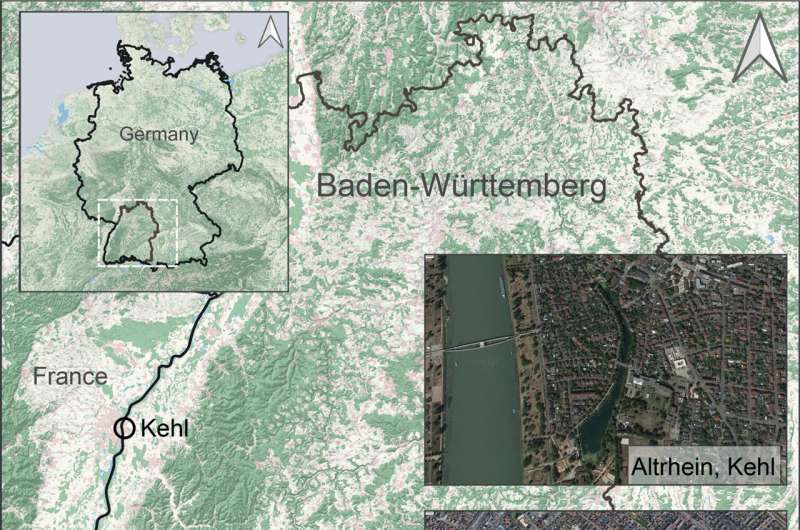North American turtles becoming endemic in South Baden, possibly posing a threat to ecosystems

Non-native turtles are reproducing independently in the wild in Germany. Environmental researcher Benno Tietz and biologist Dr. Johannes Penner of the University of Freiburg, along with Dr. Melita Vamberger of the Senckenberg Natural History Collection in Dresden, have now for the first time demonstrated that three species which originated from North America are reproducing naturally.
Their examination of a total of nearly 200 animals living in the wild in lakes in Freiburg and Kehl suggest the turtles have established themselves in a new habitat, where they could become a threat to the local ecosystem. “For two species, this is the first evidence of independent reproduction outside of their natural reproductive range. For the third species, this is the northernmost evidence of its presence up to now,” says Penner. The results of the study have been published in the journal NeoBiota.
Turtles released into the wild
Invasive species do a great deal of economic damage world-wide. They also contribute to advancing global species extinctions. Alien reptiles regularly make their way in the wild in Germany. Most often, this is because they have been released by their owners.
Large numbers of North American pond sliders (Trachemys scripta) were imported into the European Union (EU) in the 1980s and 1990s as house pets. In 1997, their import into the EU was banned. By 2016, the sale of specimens born here was also made illegal. Since then, pet shops have replaced them with other freshwater turtles, such as the river cooter (Pseudemys concinna) and the false map turtle (Graptemys pseudogeographica).
Genetic analyzes of specimens of all three species in a range of ages have now demonstrated that they are reproducing independently in local waters. “What’s surprising is that the invasive species have established themselves so far north,” says Benno Tietz. He explains, “In Europe, successful reproduction and self-maintaining populations of Trachemys scripta were only known in the Mediterranean regions and the continental climate zone of Slovenia.”
Until recently, says Tietz, it had been assumed the turtles being examined couldn’t reproduce in Central Europe due to the colder climate. Especially the false map turtle, adds Tietz, is actually quite sensitive to the cold.
Consequences for local species unclear
The invasive turtles could become a problem for indigenous species. The European pond turtle (Emys orbicularis), for example, is now only present in Germany in parts of Brandenburg. Penner reports, “In an experimental setup, the European pond turtle showed weight loss and an increased death rate when being kept together with Trachemys scripta. He says that could be caused by the larger, alien species forcing the smaller local turtles from places where they sun themselves, leading the local turtles to have problems with thermoregulation. Or perhaps the competition led to them having greater challenges when seeking food.”
Beyond that, aquatic turtles could be hosts for viruses and parasites, leading them to play a role in the spread of diseases. This could potentially have a damaging influence on other parts of the ecosystem, including amphibians, fish, or aquatic plants. On the other hand, in their study the researchers consider the alien species could assume functions in damaged ecosystems that would otherwise go unreplaced. Vamberger says these questions urgently need to be explored further. “At the same time we need to raise public awareness that people should not release—no matter what kind of species—any animals into the wild in future.”
More information:
Benno Tietz et al, Chelonian challenge: three alien species from North America are moving their reproductive boundaries in Central Europe, NeoBiota (2023). DOI: 10.3897/neobiota.82.87264
Citation:
North American turtles becoming endemic in South Baden, possibly posing a threat to ecosystems (2023, February 17)
retrieved 17 February 2023
from https://phys.org/news/2023-02-north-american-turtles-endemic-south.html
This document is subject to copyright. Apart from any fair dealing for the purpose of private study or research, no
part may be reproduced without the written permission. The content is provided for information purposes only.
For all the latest Science News Click Here
For the latest news and updates, follow us on Google News.

